The iPhone 6 Review
by Joshua Ho, Brandon Chester, Chris Heinonen & Ryan Smith on September 30, 2014 8:01 AM EST- Posted in
- Smartphones
- Apple
- Mobile
- iPhone 6
CPU Performance
Now that we have a good idea of what the A8 SoC looks like, we can talk about performance. While we covered this in the preliminary article, it’s worth going over again. For those that are unfamiliar with our test suite the CPU-based tests are mostly browser-based benchmarks. Once again, although I’m not quite happy with the state of benchmarking things we’re getting close to a more platform-agnostic solution.
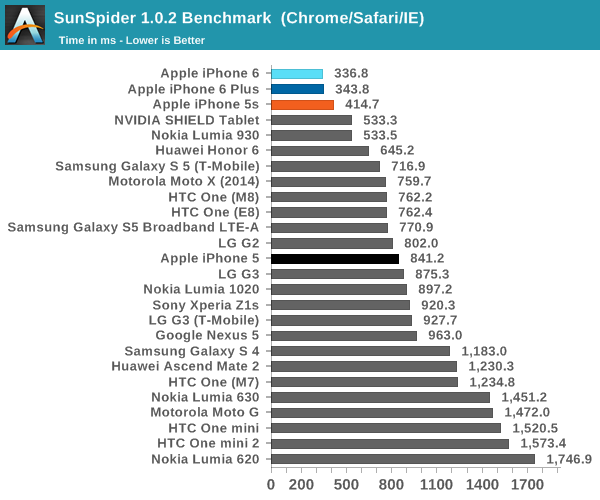
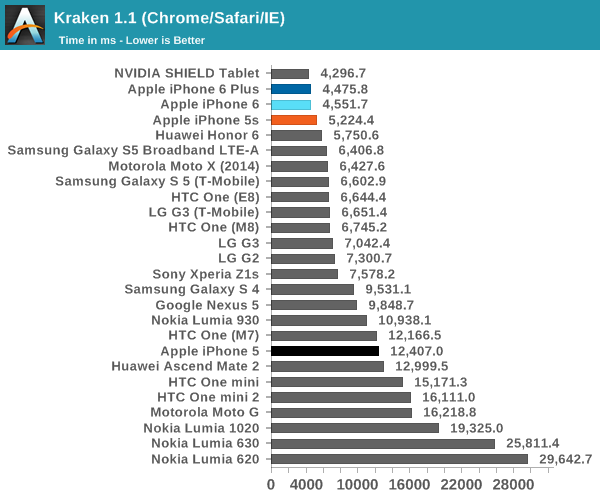
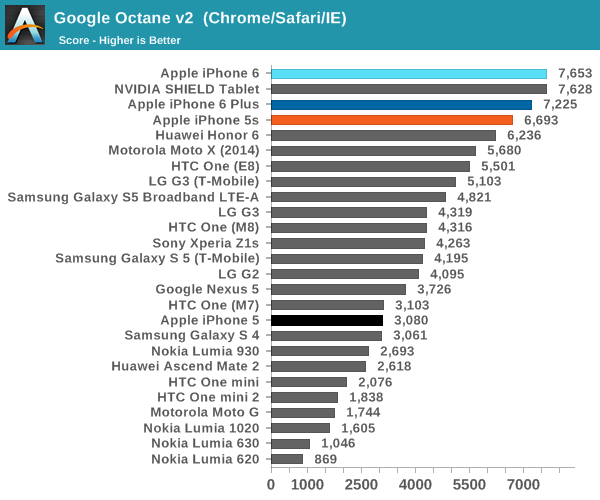
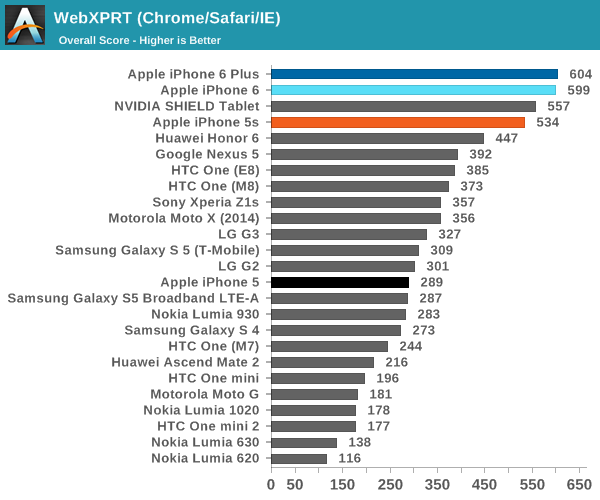
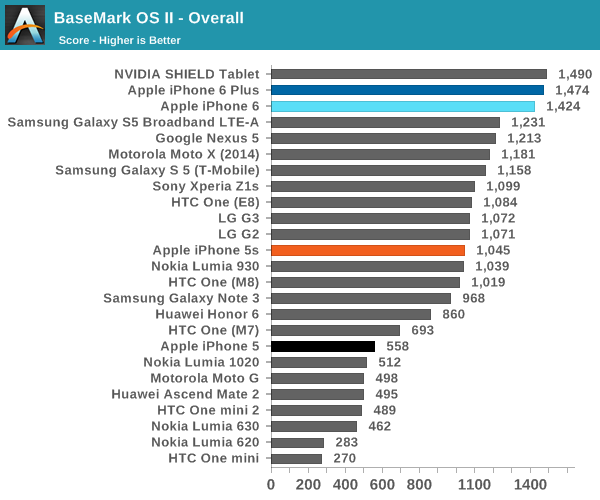
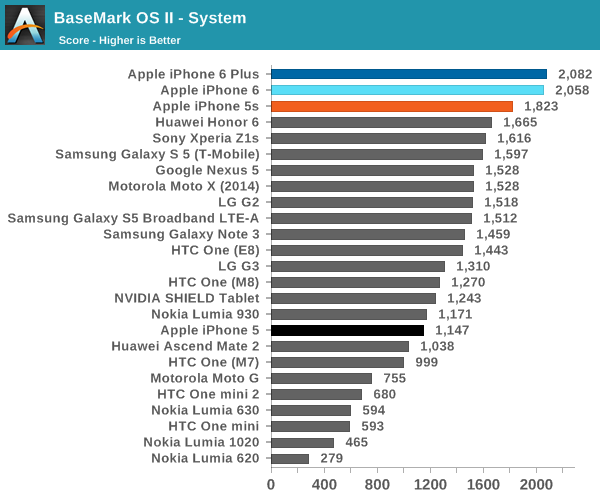
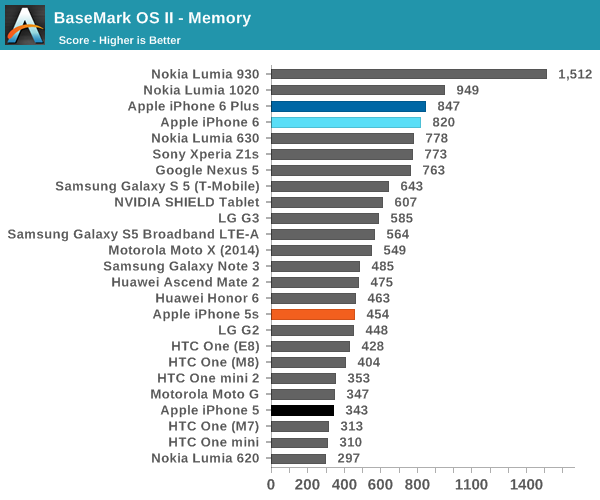
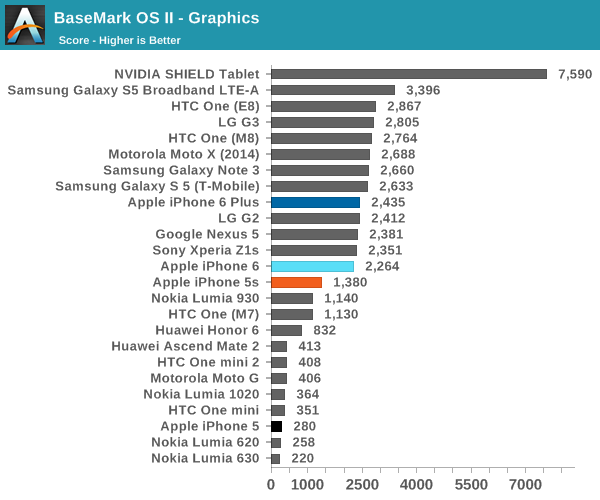
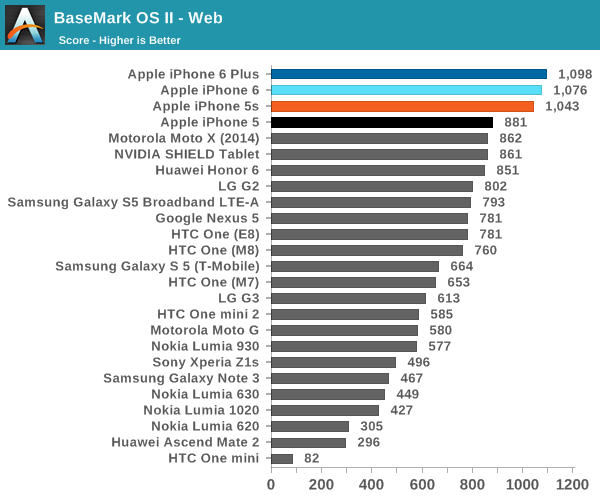
For the most part, the A8 SoC performs admirably despite the relatively low (1.38 GHz) frequency and half the cores when compared to competing SoCs. It seems that this is mostly building upon the lead that A7's Cyclone CPUs began. It remains to be seen if other SoC manufacturers will catch up in their CPU architecture at one point or another (NVIDIA's Project Denver in particular is interesting), but for now Apple seems to be quite far in the lead in CPU performance.










531 Comments
View All Comments
rUmX - Tuesday, September 30, 2014 - link
Wait for USB Type-C.mrochester - Wednesday, October 1, 2014 - link
Why are we waiting? We should have had it 2 years ago when Apple released the iPhone 5.grayson_carr - Tuesday, September 30, 2014 - link
Can't agree with you there. My wife has been through countless lightning cables. Apple branded cables either come apart at the seam between the connector and cable or just stop working after 6 months to a year with heavy use, even if there is no visible external damage. Just look at the reviews of Apple's lightning cable on their website and you'll see how terrible they are: http://store.apple.com/us/product/MD818ZM/A/lightn... (80% are 1 star out of 5). Apple covers one replacement, but after that you're on your own. Third party lightning cables, no matter how reputable the brand, always either stop working after a while or the iPhone will suddenly start saying the third party accessory is not compatible.I think the chip Apple requires in lightning cables is the culprit for most of these headaches. I think they die quickly, far before the lifetime of the cable itself, which is why cables will suddenly stop working for no apparent reason or start being labeled as not compatible.
Whatever the cause, I have NEVER had a micro USB die on me. Micro USB cables are also much cheaper than lightning cables. Finally, all of my other electronics use micro USB (Chromecast, Android phones, Kindles, cameras, etc.) which is awesome! I can have a single cable in my car that charges all of my gadgets (except my wife's stupid iPhone of course). For those three reasons, micro USB is far superior to lightning. Being able to insert the stupid cable either way doesn't come close to outweighing the benefits of micro USB I just listed.
mrochester - Tuesday, September 30, 2014 - link
And to respond to that, I've never had any Apple cables, whether it be the old dock connector or lighting cables and ports, break. Contrary to that, my sister's USB port in her Galaxy S3 broke, her Samsung charger ended up with bent pins and my partner's Samsung Galaxy S2 charger ended up fraying at the micro USB end.mrochester - Tuesday, September 30, 2014 - link
Of course, being able to insert the cable in any orientation and it being more reliable makes the benefits of the lighting connector far outweigh micro USB.grayson_carr - Tuesday, September 30, 2014 - link
Well, since reliability could go either way depending on your luck, we have...1) Being able to insert the cable in any orientation
vs.
1) Much lower price
2) A standard that is compatible with many more devices (Cameras, e-readers, Android phones and tablets, Windows phones and tablets, hard drives, portable speakers, etc., etc., etc.)
I would take the bottom two benefits any day over the top single benefit. Imagine if every company was as stubborn as Apple and designed their own cable. I would have to have 20 different types of cables lying around my house and it would be a HUGE pain trying to find the correct cable for the device. Instead, I can have one or two micro USB cables that can work with pretty much anything in my house, excluding iOS devices of course. That principle alone is enough to make me dislike Apple's lightning cable. Standards are a good thing. Proprietary sucks. Thank God other companies haven't followed Apple's footsteps in that regard yet. If they ever do, we're all screwed.
mrochester - Wednesday, October 1, 2014 - link
And I'd take the top one over the two things you listed. Having loads of micro-USB cables that are used by absolutely no devices in my house (my Canon camera is mini USB) isn't a whole lot of use. There's no need to have 20 different cables lying around your house, just 2. Your lightning cables for your iPad and iPhone, and a micro-USB cable for everything else that's stuck in 2012.GerryS - Wednesday, October 1, 2014 - link
I agree. The reversability is nice, but not much of a feature to me. Every other cable I use, except circular power connectors, requires a specific orientation. It never takes more than two tries to find the right one.techconc - Thursday, October 2, 2014 - link
@grayson_carr - Your argument falls apart in multiple places. For starters, you assume reversibility is the only advantage of the lightning cable. It's not. The lightning cable allows for 12W charging while USB is limited to just 9W. Further, you mention the ubiquity of the USB cable as if there is just one type of USB cable. I seem to have a variety of USB types of cables including micro, mini, Type A and Type B (not to mention other proprietary variants) around the house. Please explain to me how this "standard" is working any better for me or the public in general?grayson_carr - Tuesday, September 30, 2014 - link
By the way, if you're in the same boat as me, I have a tip... buy your lightning cables at RadioShack. You can buy insurance on them and it will then only cost $2 to get a replacement when they inevitably stop working.